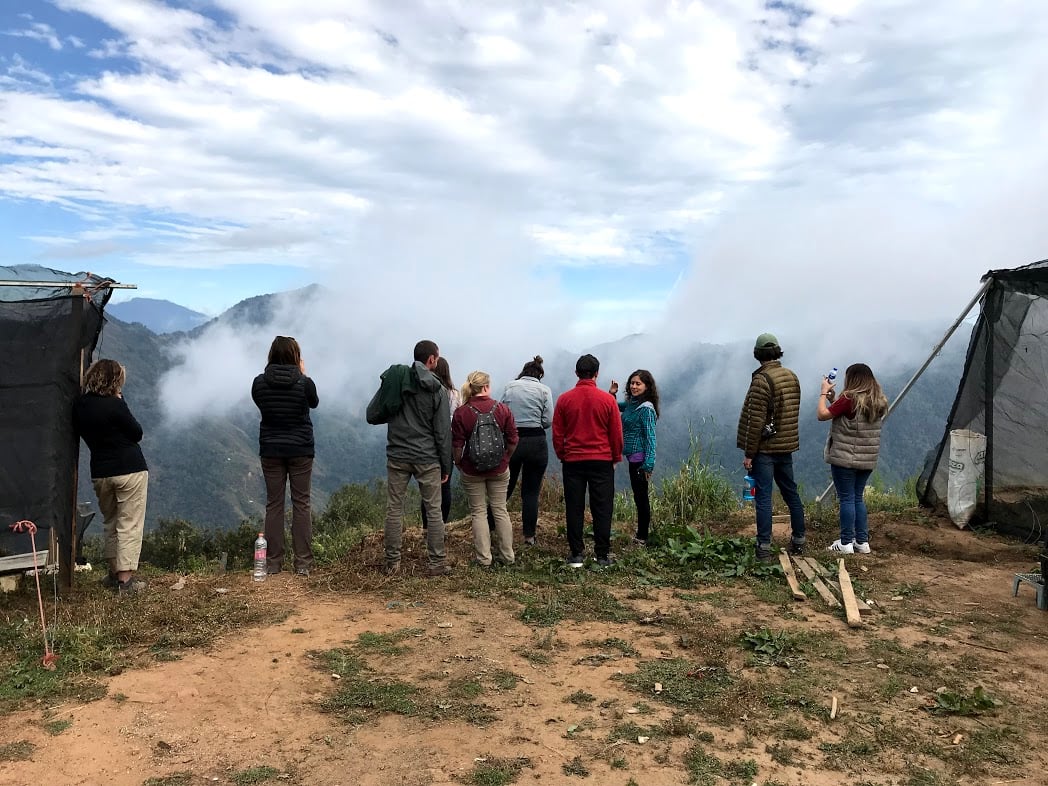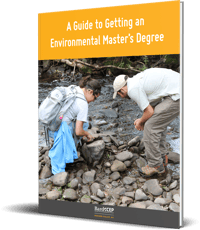Master's in Environmental Policy
M.S. in Environmental Policy
+ Page Menu
$15,000 CEP Fellowship For All Students Admitted for fall 2026
All students admitted to the Bard CEP for fall 2026 enrollment will receive a guaranteed minimum Fellowship of $15,000 for their first year at CEP. More details here.
Environmental Policy Degree Overview
Bard's MS in Environmental Policy degree is for students who want to do high-impact work addressing today's profound sustainability and environmental justice challenges, and need science-based tools, real-world experience, and career guidance to get there. The interdisciplinary degree integrates science, economics, law, and US and international policy; and throughout, includes a focus on engaging stakeholders to ensure that policies promote just and sustainable outcomes.
Classes simultaneously center on scientific understanding as well as on economic and policy solutions, training future leaders to guide efforts to build a sustainable future. Students gain hands-on experience through a 6-month professional internship, faculty-mentored research project, and community-based learning in both the Hudson Valley and in Oaxaca, Mexico.
For those wondering how to fight for the environment—this degree is your answer.
Classroom to Impact in 9 Months
The world needs solutions now to sustainability challenges from climate to biodiversity loss, ocean pollution to air toxics. Bard's Environmental Policy Master's program is unique in its ability to enable students to begin high-impact work after only nine months of study. Students spend an intensive two semesters at Bard, mastering the tools required to drive effective policy change. In June of the second year, they then spread out across the US and internationally, creating impact through a required, 4-6 month high-level Internship followed by an outcome-oriented Capstone Project that typically builds on the internship.
First Year: Academic Training in Environmental Policy
The first-year curriculum is uniquely integrated to connect core scientific principles to socioeconomic impacts, and economic, political, and legislative responses to environmental challenges. Twenty-first century environmental policy moves well beyond controlling industrial emissions of pollutants. The complexity of environmental problems requires re-imagining and redesigning of food, energy, transportation, and waste systems, as well as city, national, and international economies - always with a focus on a just transition to a sustainable future.
First-year scientific and environmental policy courses cover several key topics:
- Foundations and general concepts
-
Water
-
Carbon and Energy
-
Food, Livelihoods, and Biodiversity
-
Sustainable Communities (Industrial Ecology, Urban Systems, Waste)
All students also participate in a January term course in Oaxaca, Mexico on local and regional sustainability solutions in a developing economy context.
Second Year: High-Impact Career Training
Beginning in June of the second year, students explore their individual career interests through a required 4-6 month, full-time professional internship. Internship sites range from Australia to China, South Africa to Geneva, NYC to DC, and across the US. Students then build on their internships in sustainability by researching and writing a Capstone Project. Some students qualify for a non-residence Capstone project, creating the opportunity for a fully-remote second year.
The two-year curriculum ensures that graduates develop both broad and deep knowledge of climate science and environmental policy issues; a strong suite of analytical, communication, and problem-solving skills; an understanding of how to ensure justice in policy decisions; professional experience in their chosen field; and finally, specialized expertise on the particular topic of their research project. In short, Bard's environmental masters degree is designed to deliver true mastery over the student's area of focus, providing a strong foundation for success wherever their future environmental policy careers will take them.
.png?width=600&name=Copy%20of%20Untitled%20(1).png)
Distinctive Features of Bard's Environmental Policy Degree:

Integrated, Interdisciplinary Curriculum
The Master's in Environmental Policy features a unique, modular core curriculum where students explore issues like air and atmosphere pollution, biodiversity loss, or ecosystem services simultaneously in their science, economics, law and policy courses. This is a unique structure for a graduate degree in environmental science, and it creates a powerful dialogue across disciplines, always driving toward solutions. Other masters programs cannot deliver this level of interdisciplinary focus across classes, as students typically do not take the same courses together. Bard's core curriculum supports faculty to coordinate closely across classes, allowing the program to complete the delivery of the foundational policy toolkit in nine months. This frees up the second year of study for the professional internship, and a capstone project.

1:1 Faculty Engagement
Bard CEP offers every student individualized engagement with expert faculty on student research, writing, and communication. Our small class size and dedicated graduate faculty provide students with unmatched access to their professors and mentorship opportunities. Bard was recently ranked #1 in the US for classroom experience - Bard CEP carries that tradition of excellence forward.

High-level, Extended Professional Internships
All MS students complete a 4-6 month, student-driven, full-time internship from June to January of the second year in NYC, DC, internationally, or wherever leading-edge policy work is being done.
The internship is a major item on our graduates' resumes, and supports development of their career networks. Between 30% and 50% of internships turn directly into jobs. The internship also typically forms the basis for the students' Master's Capstone Projects.
Bard helps students find internship opportunities with a variety of institutions, and is continuously expanding its list of internship sponsors. The internship allows students to follow their preferred areas of specialization locally, elsewhere in the United States, or abroad. The internship gives students an applied focus to their degree and an opportunity to learn in a professional setting the job-specific skills they will use upon graduation.
Selected List of Internship Placements:
- Amazónicos por la Amazonía–AMPA (Peru)
- American Museum of Natural History, Center for Biodi-versity and Conservation
- Campanario Research Reserve (Costa Rica)
- Center for Disease Control
- Chinese Academy of Sciences Global Lake Ecological Observatory Network (China)
- Conservation Law Foundation
- Council on Competitiveness
- Earth Pledge
- Ecologic Institute (Germany)
- Environ-mental Advocates of New York
- Environmental Defense Fund
- Federal Reserve Bank of Atlanta
- Food and Water Watch
- German Marshall Fund
- IBM Corporation
- Instituto de la Naturaleza y la Sociedad INSO (Mexico)
- International Food Policy Research Institute
- Malawi Sustainable Agricultural Project (Africa)
- University of Maryland Harry R. Hughes Center for Agro-Ecology
- National Resources Defense Council
- New York State Energy Research and Development Authority
- Nike
- New York City Department of Parks and Recreation
- Ocean Acidification Research Center
- Ohio Environmental Protection Agency
- Pace Energy and Climate Center
- Resources for the Future
- Riverkeeper, Inc.
- Scenic Hudson
- Slow Food USA
- The Beacon Institute
- The Energy and Resource Institute, TERI (India)
- The Nature Conservancy
- U.S. Agency for International Development
- U.S. Environmental Protection Agency, Region II, Wetlands Division
- United Nations Environment Programme
- Winrock Internation-al
- Woods Hole Research Center
- World Resources Institute

Global and Local Engagement + Peace Corps Option
Students engage hands-on with local, regional and global sustainability challenges while in residence at Bard in New York's scenic Hudson Valley. During their first year, students work with local community groups to address regional PFAS/PFOS water contamination.
In January of their first year, all students also participate in a ten-day immersion in Oaxaca, Mexico, focused on sustainable development. Read this letter home from Professor Segarra, and watch this video for more information.

In the second year, some students pursue international internships, while others work on local and regional challenges in the US.
Bard CEP also offers students the opportunity to combine their graduate work with joining the Peace Corps.

Individualized Research Opportunities
At Bard, the Capstone Project provides the opportunity for students to develop true mastery in their chosen field of interest, ranging across topics such as water, energy, biodiversity, toxic pollution, and environmental justice. Unlike at many other schools where a capstone project is derivative of a faculty member's research interest, at Bard, students develop their own capstone topics, typically focused on solving an environmental policy problem identified during the student's internship. In these cases, students devote an entire year to practical work in the area in which they are passionate: six months of hands-on experience, coupled with six months of academic analysis and reflection through their capstone work. This kind of mastery provides a strong foundation for career success. Each Master's Project is carefully mentored by two Bard CEP Faculty members, including a primary and secondary advisor.

Career Focus
A policy career is a career "changing the rules" to incentivize sustainable outcomes. Bard MS graduates do this work in a wide variety of professional settings in national, international, state and local government; in nongovernmental organizations; in consulting firms and private corporations; and in development, advocacy, and conservation organizations. In a typical year, close to 40% of Bard CEP students are already employed upon graduation, primarily as a result of job offers arising from the professional internship. On average, 75-85% of graduates find work in the environmental sector within six months of graduation.
Career Development
Students are thinking about career outcomes from day one at Bard. While studying environmental or climate policy, students are also exposed to the work of various organizations (from local to global) and learn about the many career opportunities in the vast field of environmental policy.
Career development exercises are also intentionally integrated into various coursework and include developing the following skills:
- Resume and cover letter writing
- Conducting informational interviews
- Blog and memo writing
- Professional networking
- Personal branding
- The "art of the ask"
- Presentations - building decks and giving effective public presentations
To learn about the diverse careers our graduates are pursuing, please review our Alumni Profiles.
"The theoretical and practical training from Bard CEP was key to my entry into international development. My consulting assignments for international financial institutions vary from climate change planning to environmental impact mitigation to urban development in Latin America and East Africa — all have required a holistic approach and a firm grounding in understanding economic, political, technical and community angles to develop sustainable solutions with government and donor clients."
— Amy Faust '07, Consultant, Environmental Planning, UK Department for International Development/World Bank, Dar es Salaam, Tanzania
Environmental Policy Master's Course Work
The first-year courses link natural ecosystems and their functioning to the impact of socioeconomic activities, and to the political, institutional, and legislative responses that address environmental problems.
Students master the basic concepts of environmental and natural resource economics, environmental policy, and detailed analyses of U.S. and international climate law and policy. Courses emphasize analytical frameworks and basic principles through examples and case studies. Joint class sessions, field trips, guest lectures, and conferences expose students to the critical issues and contemporary practices of environmental policy.
Throughout, there is a focus on stakeholder engagement as a primary strategy to ensure justice in policy-making. The nine-month interdisciplinary curriculum, combined with the internship and the Capstone project in the second year, allow students to specialize in their chosen field of interest and launch a high-impact career changing the rules.
Course Descriptions Faculty Members
Communication and Policy-Making Strategy
Environmental Policy professionals must be able to communicate their knowledge clearly and effectively through the spoken and written word as well as with images, data, and figures. Courses emphasize various modes of communication and persuasion through writing exercises and group presentations. Regional and international implications of “local” environmental problems are explored. Special emphasis is given to the problem of translating scientific knowledge into workable policies. Students learn the scientific basis underlying climate solutions and the difficulty of policymaking under conditions of risk, scientific uncertainty, and incomplete information.
Integrating Environmental Science and Policy for a Sustainable Future
Courses in economics, law, and policy explore how society might respond to the far-reaching sustainability challenges facing humanity. The policy tools that are available including laws, regulations, market-based instruments, technology and infrastructure policy, and voluntary agreements, are shaped by a variety of political, cultural, and ethical forces. Students analyze how these factors come together to influence the policy-making process. They also analyze how the tools can be applied locally, regionally, and globally to influence behavior, achieve or go beyond compliance, and foster sustainable transformation of communities and economic systems.
Courses for the MS in Environmental Policy
Total Credits for MSEP = 60
Year 1 (full-time students)*
*Students interested in part-time enrollment should contact the Admissions Team to learn about the part-time course of study.
Environmental Science of Natural and Built Environments (Fall + Spring)
This course uses a systems framework to understand local, regional and global biogeochemical processes as a foundation to assess environmental impacts on social-ecological systems in the Anthropocene. In coordination with the economics, law, and policy courses in the program, this two-semester science sequence teaches students fundamental concepts in scientific assessment, including "Western" and indigenous perspectives, which are then applied to topics such as global nitrogen loading, Indigenous forest management and implications for terrestrial carbon sequestration under climate change, ecological intensification of agriculture, and how material flows analysis underpins the Circular Economy. Case studies are chosen to highlight the intersection between scientific understanding and the institutional inequities that lead to injustices in the distribution of environmental goods and harms, with examples of pathways to solutions.
By the end of the course, students will be equipped to:
- Critically assess arguments in the peer-reviewed science literature and synthesize key ideas across a wide range of environmental topics
- Understand and engage in discussion of the ways in which race and difference impact an individual’s health and welfare outcomes in the face of environmental harms
- Utilize a “systems” framework considering mass and energy balance to assess environmental health, including an understanding of life cycle assessment
- Consider alternative perceptions of “science” as a function of culture and tradition and how these may influence environmental management
- Confidently translate peer-reviewed science articles into common language to meaningfully interact with non-experts on environmental issues
Natural Resource Economics and Environmental Economics (Fall + Spring)
The study of economics involves both a normative and positive frame; this year-long course offers both. We trace and analyze various schools of thought and their proponents including Smith, Marx, Keynes, and Hayek, which allows us to view current policy debates through multiple historical and value lenses. While economics has traditionally emphasized efficiency, modern economics has sharply pivoted towards values of sustainability, fairness, equality, and justice. This course incorporates these vital principles to assess the constraints and promises of policymaking, especially when paired with statistical tools that permit rigorous empirical testing of theories. The combination of theory and practice fosters students to hone their worldviews and value frames as well as acquire practical professional skills.
Learning Outcomes
- Recognize and appreciate competing value frames that inform policy
- Develop practical empirical skills to quantify, measure, and test the efficacy of various policy interventions
- Learn statistical mechanisms to identify causal linkages between policy interventions to outcomes
Environmental Law for Policy (Fall)
This course provides students with an introduction to the fundamentals principles of environmental law. We begin with an overview of the US legal system and then move on to assess key federal, state, and local environmental laws and regulations. Towards the end of the class, we will also study the international environmental lawmaking process, with a focus on the international climate regime that has developed under the United Nations Framework Convention on Climate Change. Throughout the course, we will consider the political economy of environmental regulation and the interests of different stakeholders, including environmental justice communities.
Upon completion of the course, students should have an understanding of the following concepts:
- The structure and goals of major federal environmental laws including the Clean Air Act, the Clean Water Act, and the National Environmental Policy Act
- The administrative lawmaking process as well as the procedure for challenging administrative rules
- The history and present goals of the environmental justice movement
- The relationship between federal, state, and local bodies of law
Students will also gain experience interpreting judicial opinions and other legal texts, including federal and state statutes.
Environmental Policy (Fall + Spring)
Learning Outcomes:
- Knowledge of core concepts of qualitative policy analysis
- Understanding how historical legacies of of injustice shape the current moment in environmental and climate policy
- Analyzing social movement formation as a critical tool in environmental and climate politics
- Identifying how the interplay of ideas, interests and institutions at the domestic and international levels influence how environmental and climate policy problems are identified, and how and what types of solutions are crafted and implemented.
Tools of Analysis: Statistics and Econometrics (Fall)
This course introduces students to quantitative tools used for analyzing data, understanding the nature of causality, and developing policy. Through real-world applications, this course focuses on developing a logical structure underlying statistics and eschewing formulaic learning. A deep understanding of statistics allows students to recognize that statistical methods (such as the t test, ANOVA, and regression) form a logical and nested progression.
Learning Outcomes:
- Ability to explain statistical concepts rigorously in plain English
- Understand the nature and meaning of causality
- Develop an appreciation for connections among geometry, trigonometry, and statistics
- Test any hypothesis using a logical sequence of steps
- Write code in a programming language such as STATA or R
Communication (Fall + Spring)
Communication skills are crucial to educators’ and policymakers’ ability to mobilize against structural environmental and climate change injustices. Recognizing this, in the Communication course at Bard CEP, students work to become inclusive and inspiring writers and speakers. Students learn how to take audience and purpose into account as they read, synthesize and communicate complex science, economic and policy information. The course covers both academic and professional written and oral genres: the blog post, memo, lit review, cover letter, slide presentation, interview.
This course supports students’ ability to:
- frame their writing/presentations for differing purposes and audiences, with an emphasis on engaging community stakeholders
- find and evaluate relevant research and communicate it accessibly and accurately
- support a reader through an argument via effective introductory/concluding material, coherent sections and paragraphs, thoughtfully placed transitions, precise word choice, and clear, concise, sentences
- craft and deliver visually engaging, effectively structured, and memorable slide presentations
- analyze their own and their classmates’ writing and presentations and give and receive constructive feedback
Sustainable Development: Oaxaca, Mexico Immersion Course (January)
Oaxaca is one of the most highly biodiverse and culturally diverse states in Mexico, as well as its poorest. In the January class, we work with Zapotec and Mixtec communities in the Sierra Juarez and Sierra Sur mountain ranges, who play a critical role in conservation and watershed health. Historically marginalized by the Mexican state and elites, these communities are now exerting significant control over how they manage their forests and water and in the process, developing new opportunities for sustainable business and improving livelihoods. The January class will provide us with an overview of how new partnerships to support these efforts are built between communities, state agencies, international non-profit organizations and corporations, as well as within communities. Understanding the dynamics of building trust within a system in which many indigenous communities have had little faith, is a critical conceptual component of the trip. Students will also have an introduction to the different forms of indigenous land tenure and local governance structures that facilitate accomplishing shared goals within communities and their partners. In addition, the class will provide students with a basic framework of conducting team-based research in the field, from note-taking to triangulation and analysis.
Tools of Analysis: Geographic Information Systems (Spring)
Using ESRI GIS software and associated apps, students will receive formal instruction in the fundamentals of using spatial information, conducting spatial analysis, and producing high-quality cartographic products. Students will learn how GIS may be used as a tool for identifying and assessing environmental justice (EJ) issues at the local, regional and global scale. Students will apply these GIS skills and knowledge base to a team-based research project focused on an environmental justice problem. The course culminates in a presentation session, where students show their analysis and results to their peers, professors and the greater Bard community.
After taking this course, a student will better able to:
- Perform geographic inquiry - ask spatially-based questions, acquire and evaluate data, develop methods, and summarize results
- Produce effective maps for decision-making through traditional cartographic techniques as well as web-based applications
- Use GIS in creating solutions to environmentally and inequity-based problems
Topics in Environmental Policy: Energy Policy/Food Policy (Spring Y1 + Spring Y2)
The content of the Food/Energy Policy course is continually updated to reflect cutting edge policy and legislative issues. It is generally supported with invited speakers who span a spectrum of stakeholders from sustainability coordinators in private sector food companies to labor organizers working on protecting farmer worker rights to legal defense organizations working on banning toxic pesticides, in the case of food policy, or for energy policy, state-level regulators developing policy on off-shore wind to electric vehicle experts speaking on charging infrastructure. Students engage in teams to develop policy position statements for presentations to stakeholders to gain skill in integrating across competing interests.
This course supports students’ ability to:
- Explore specific policy challenges and solutions in the food or energy system arenas that may lead to the radical change needed to address these global issues;
- Draw on the disciplinary expertise they are gaining in their economics, science, law and politics courses to take “theory into practice”;
- Understand the perspectives of various stakeholders on an issue, and explore the art of compromise in policy formulation.
Year 2 (all students)
Master's Internship (Summer + Fall)
Extended Professional Internship
The extended professional internship is a unique feature of the Bard CEP program. In the second year of study, all students complete a four-to-six month, high-level internship in locations ranging from Washington, D.C., to New York City, Texas, Oregon, and Alaska; across the world in Thailand, South Africa, Geneva; and close to home, in the Hudson Valley. Some recent internship experiences are captured in this video.
The internship typically forms the basis for the students' Master's Capstone Projects. Between 30% and 50% of internships turn directly into jobs. The internship is a major item on our graduates' resumes, and supports development of their career networks.
In their own words . . .
“My internship experience through Bard CEP was a unique life and career experience. I was a project assistant for WASTE, a Dutch NGO (nongovernmental organization), working on implementing an integrated solid waste management system in Haiti. Being engaged in fieldwork for six months helped me to truly understand the realities while allowing me to perform to my highest capabilities. The opportunity launched my international development career and helped me grow as a young professional. I am currently working at VNG International as a policy advisor.” —Rachel Savain ’12
Placement Options
Bard CEP helps students find internship opportunities with a variety of institutions, and is continuously expanding its list of internship sponsors. The internship allows students to follow their preferred areas of specialization locally, elsewhere in the United States, or abroad. The internship gives students an applied focus to their degree and an opportunity to learn in a professional setting the job-specific skills they will use upon graduation. Internships also expand professional networks, often leading directly or indirectly to employment.
Students in theMaster's International programcomplete the internship through their Peace Corps service. Students in thejoint degree programwith Pace complete two internships/externships during their summer months at Pace to satisfy the Bard CEP internship requirement. Students in thedual M.S./MATprogram satisfy the requirement through student teaching. Students in theM.S./MBA programfulfill their internship through theNYCLab coursein the MBA program.
Where We've Interned
Bard CEP students undertake internships locally, nationally, or internationally. Past internship locations include Catskill Rail to Trail Conservancy in the Hudson Valley, Resources for the Future in Washington, D.C, and the World Health Organization in Germany.
Here is a list of organizations where our students have spent their internships:
Amazónicos por la Amazonía–AMPA (Peru) | American Museum of Natural History, Center for Biodi-versity and Conservation | Campanario Research Reserve (Costa Rica) | Center for Disease Control | Chinese Academy of Sciences Global Lake Ecological Observatory Network (China) | Conservation Law Foundation | Council on Competitiveness | Earth Pledge | Ecologic Institute (Germany) | Environ-mental Advocates of New York | Environmental Defense Fund | Federal Reserve Bank of Atlanta | Food and Water Watch | German Marshall Fund | IBM Corporation | Instituto de la Naturaleza y la Sociedad INSO (Mexico) | International Food Policy Research Institute | Malawi Sustainable Agricultural Project (Africa) | University of Maryland Harry R. Hughes Center for Agro-Ecology | National Resources Defense Council | New York State Energy Research and Development Authority | Nike | New York City Department of Parks and Recreation | Ocean Acidification Research Center | Ohio Environmental Protection Agency | Pace Energy and Climate Center | Resources for the Future | Riverkeeper, Inc. | Scenic Hudson | Slow Food USA | The Beacon Institute | The Energy and Resource Institute, TERI (India) | The Nature Conservancy | U.S. Agency for International Development | U.S. Environmental Protection Agency, Region II, Wetlands Division | United Nations Environment Programme | Winrock International | Woods Hole Research Center | World Resources Institute
Capstone Proposal (Fall)
Students can pursue two different Master’s Capstone avenues: (1) the Thesis, which is designed to help students understand evidence-based policy formation by generating a research question, developing its proof and communicating these ideas to a potential policymaker audience, and (2) the Project, which is designed to replicate a professional experience, either in the form of a consulting project or a communication piece.
Students begin to formalize capstone ideas the summer after their first year, in consultation with an advisor on the faculty. The internship allows students to explore policy issues and usually serves as the springboard for the capstone.
Topics in Environmental Policy: Energy Policy/Food Policy (Spring Y1 + Spring Y2)
This seminar is offered annually in the spring and covers current topics in environmental policy. The class is held jointly with first year students, allowing the two classes to work together and share perspectives.
Energy Policy
This seminar provides an interdisciplinary review of the technology, economics, and politics of energy production, distribution, and use by humans with a focus on policy-level decisions, including recent events shaping a changing landscape. The course provides an overview of policy frameworks, available technologies, and analytic tools followed by an in-depth review of current systems and the New York State’s “Reforming the Energy Vision” (REV) proceedings, which seek to change the landscape.
Food Policy
This seminar investigates the influence of federal agriculture policy by exploring the Farm Bill and Clean Air and Clean Water Acts and the degree of influence they have on farming practices, role of large multinationals on food systems, food justice issues, critiques of “local food,” controversies around the USDA National Organic Program, GMO labeling laws, competition created by biofuels for land and water resources, and how crop insurance is playing a role in the loss of land enrolled in Conservation Reserve Programs, among other topics.
Leadership and Careers Seminar (Spring)
Careers in environmental policy require excellent analytical skills, but also the ability to lead policy implementation. This class focuses on values-based leadership—understanding different leadership approaches, critical skills, and pathways to engage a community in a policy vision. It emphasizes self-awareness and communication as foundations for leadership. Students learn how leaders communicate clearly and accurately about environmental problems, becoming familiar with various approaches to framing and conveying messages. The course also helps students develop their career skills, focusing on fundraising and negotiation skills, as well as interviewing techniques, using social media creatively and effectively.
Capstone Project + Seminar (Spring)
The Capstone Seminar offers a platform for students to present successive iterations of their capstone research. Students discuss the policy problems and methodological challenges they encounter in their work, along with different ways of dealing with them. The seminar also offers students the chance to receive feedback from their peers and the Bard CEP faculty, and to focus on effectively communicating the results of their research.
Student-Driven Capstone
At Bard, the Master's Project provides the opportunity for students to develop true mastery in their chosen field of interest, ranging across topics such as water, energy, biodiversity, toxic pollution, and environmental justice. Unlike at many other schools where a capstone project is derivative of a faculty member's research interest, at Bard, students develop their own capstone topics, typically focused on solving an environmental policy problem identified during the student's internship. In these cases, students devote an entire year to practical work in the area in which they are passionate: six months of hands-on experience, coupled with six months of academic analysis and reflection through their capstone work. This kind of mastery provides a strong foundation for career success. Each Master's Project is carefully mentored by two Bard CEP Faculty members, including a primary and secondary advisor.
How the Master's Project works:
Project Options
Students can pursue two different Master's Capstone avenues: (1) the Thesis, which is designed to help students understand evidence-based policy formation by generating a research question, developing its proof, and communicating these ideas to a potential policymaker audience; and (2) the Project, which is designed to replicate a professional experience, either in the form of a consulting project or a communication piece. Drawing on knowledge from the first-year coursework, students integrate aspects of the natural and social sciences in their capstone analysis and policy recommendations.
Project Timing
Students begin to formalize capstone ideas the summer after their first year, in consultation with an advisor on the faculty. The internship allows students to explore policy issues and usually serves as the springboard for the capstone. During the internship period, a formal proposal is presented to the student’s advisor, who chairs the student’s Capstone Committee, which is composed of three members (at least two of whom are Bard CEP faculty). An outside expert is often included to provide specialized advice on the capstone.
Master's Seminar
The Master's Seminar offers a platform for students to present successive iterations of their capstone research. Students discuss the policy problems and methodological challenges they encounter in their work, along with different ways of dealing with them. The seminar also offers students the chance to receive feedback from their peers and the Bard CEP Faculty, and to focus on effectively communicating the results of their research.
Sample Master's Project Topics:
- Land and Water Resource Management
- Assessing Vineyard Irrigation Demand under Four-Climate Futures: Methods to Enhance Resiliency to Climate Change in Sonoma, California (K. Lambert ’13: Richmond, Vermont)
- Predicting Wetland Susceptibility to Phragmites australis: An Assessment of Environmental Condi-tions in Coastal Louisiana with Recommendations for Wetland Management (G. Ramseur ’13: Ocean Springs, Mississippi)
- Modeling Southern Resident Killer Whale Population Response to Chinook Salmon Abundance and its Implications for Recovery Policy (J. Rohrback, ’13: Seattle, Washington)
- Managing Stormwater in the Hudson Valley: A Cost-Benefit Analysis of Permeable Pavement (E. Murphy ’14: New Paltz, New York)
- Expanding the Wildlife Conservation Funding Model in Michigan: Options for the Future (K. Rorah ’14: Algonac, Michigan)
- Institutionalizing Integrated Regional Water Management in the Sierra Nevada: A New Hope (D. Lapin ’14: Sunnyvale, California)
- Improving Cost-Efficiency and Flexibility of Farmland Conservation Tools (T. Duvall ’15: Kingston, New York)
- Factors Influencing Rangeland Degradation in the Tibetan Highlands of China: Perspectives of Traditional Herders (S. Dongcuo ’15: Lhasa, China)
- Environmental Risk Management
- Our Disposable World: Emerging Plastic Bag Policies in the U.S. (K. Kokal ’13: Fort Myers, Florida)
- Risk Assessment and Regulation of Wastewater Pollution from Unconventional Natural Gas Devel-opment in the Marcellus Shale (M. Segarnick ’13: Maplewood, New Jersey)
- GMO Labeling in the United States: Legal, Economic and Political Perspectives on State Labeling Policies (S. Zeringo ’14: Cinnaminson, New Jersey)
- Implications of Emerging Evidence of Glyphosate Toxicity for Federal Risk Assessment (L. Hubbell ’14: Princeton, New Jersey)
- Introducing Road Salt SMART: Salt Management and Application Reduction Techniques to Save Money and the Environment (E. McCarthy ’15: Brooklyn, New York)
- Assessing the Risk Management of Nuclear Energy in Turkey (C. Durmaz Dogan ’14: Bursa, Turkey)
- Urban and Regional Planning
- Forging Consensus? The Prospective Role of Regional Governance in the Planning of ‘Shrinking Cities’ (B. Starodaj ’12: New Britain, Connecticut)
- Moving Forward with Sustainable Transport in Mexico: A Comparative Analysis of Mexico City and Guadalajara (T. Alarcon ’14: Guadalajara, Mexico)
- The Costs of Spatially Fragmented Development: An Econometric Analysis (B. Sykes ’15: New Baltimore, New York)
- Understanding the Impacts of Drought on the Tourism Industry in South Lake Tahoe, California (M. Murray ’15: Traverse City, Michigan)
- Distributed Cogeneration as a Solution to New York City Brownfields: Increasing Energy Efficient Production without Increasing Land Use (M. Colligan ’15: Red Hook, New York)
- Water Quality in the Village of Red Hook, New York: Evaluation of Possible Contamination from Septic Systems (A. Prior-Grosch ’13: Haverhill, Massachusetts)
- Supporting Urban Forestry in U.S. Cities: Community, NGO and State Collaboration (L. Lafleur ’14: San Diego, California)
- Economic Growth and Sustainable Development
- A Feasibility Analysis of Waste to Energy in Nairobi, Kenya (C. Munyua ’13: Thika, Kenya)
- Building Public-Private Partnerships: Integrating Informal Recyclers into Solid Waste Management in Haiti (R. Savain ’12: Plantation, Florida)
- Tree Crop Investment in Northern Ghana: An Evaluation of Vertical Integration (S. Slavinski ’14: San Marcos, California)
- Managing the Impacts of Oil Palm: Policy Options in Indonesia (A. Kroeger ’14: Libertyville, Illinois)
- Turning Organic Waste into Fuel: Lessons for Implementing a Renewable Natural Gas Project in New York City (D. Bissett ’14: Baldwin, New York)
- Climate Change Mitigation and Adaptation
- The Balance of Power: Distributional Considerations in Calculating the Avoided Emissions of Renewable Energy (O. Peckham ’14: Raleigh, North Carolina)
- Gauging Perceptions of Ocean Acidification in Alaska (L. Frisch ’14: Chicago, Illinois)
- Considering Gender Equity in Climate Change Finance Mechanisms (M. Granat ’14: Auburn, California)
- Assessing Household Vulnerability in Uganda: A Socio-Ecological Systems Approach (M. Gilligan ’15: Dallas, Pennsylvania)
- Assessing Profitability of Climate Change Adaptation Investments: The Case of Farmers in Laos (J. Peck ’15: Topsham, Vermont)
- Emerging Climate Governance: Partnerships among States, NGOs, and International Agencies in the Dominican Republic, Mexico, and Peru (J. Hanna ’15: Santo Domingo, Dominican Republic)
- Reducing Greenhouse Gas Emissions from Food Waste in the Restaurant Industry (S. DiNovi ’14: Mundelein, Illinois)
2023-2024 Academic Calendar
|
August 28-September 1, 2023 |
Workshop Week |
|
September 4, 2023 |
Fall Semester Classes Begin |
|
October 9-10, 2023 |
Fall Reading Days |
|
November 20-24, 2023 |
Thanksgiving Reading Week |
|
December 18-22, 2023 |
Exam Week |
|
December 25, 2023 - January 12, 2024 |
Winter Recess |
|
January 15-26, 2024 |
MS Sustainable Development in Oaxaca Course |
|
January 29-February 2, 2024 |
Research & Writing Week |
|
February 4, 2024 |
Spring Semester Classes Begin |
|
March 18-22, 2024 |
Spring Reading Week |
|
May 20-24, 2024 |
Exam Week |
|
May 23-24, 2024 |
Capstone Presentations |
|
May 25, 2023 |
Commencement 2024 |
Fall 2023 Semester:
First-Year Students: August 28 - December 22
Second-Year Students: September 4 - December 22
Spring 2024 Semester:
First-Year Students: January 15 - May 24
Second-Year Students: February 5 - May 24
Sample Weekly Schedule
|
Monday |
Tuesday |
Wednesday |
Thursday |
Friday |
|
Environmental Science |
Economics 9:30-11:00am |
Environmental Science 10:00-11:30am |
Economics 9:30-11:00am |
Environmental Law 10:00-11:30am |
| Communication 11:30am-1:00pm |
Brown Bag Series/ National Climate Seminar 12:00-1:00pm |
|||
|
Statistics/ |
Environmental Policy 1:30-3:00pm |
Environmental Law 1:30-3:00pm |
Environmental Policy 1:30-3:00pm |
Statistics/ Econometrics 1:30-3:00pm |
2024-2025 Academic Calendar*
|
August 26-August 30, 2024 |
Workshop Week |
|
September 2, 2024 |
Fall Semester Classes Begin |
|
October 14-15, 2024 |
Fall Reading Days |
|
November 25-29, 2024 |
Thanksgiving Reading Week |
|
December 16-20, 2024 |
Exam Week |
|
December 23, 2024 - January 10, 2025 |
Winter Recess |
|
January 13-24, 2025 |
MS Sustainable Development in Oaxaca Course |
|
January 27-January 31, 2025 |
Research & Writing Week |
|
February 3, 2025 |
Spring Semester Classes Begin |
|
March 17-21, 2025 |
Spring Reading Week |
|
May 19-23, 2025 |
Exam Week |
|
May 22-23, 2025 |
Capstone Presentations |
|
May 24, 2025 |
Commencement 2024 |
Fall 2024 Semester:
First-Year Students: August 26 - December 20
Second-Year Students: September 2 - December 20
Spring 2025 Semester:
First-Year Students: January 13 - May 23
Second-Year Students: February 3 - May 23
Sample Weekly Schedule
|
Monday |
Tuesday |
Wednesday |
Thursday |
Friday |
|
Environmental Science |
Economics 9:30-11:00am |
Environmental Science 10:00-11:30am |
Economics 9:30-11:00am |
Environmental Law 10:00-11:30am |
| Communication 11:30am-1:00pm |
Brown Bag Series/ National Climate Seminar 12:00-1:00pm |
|||
|
Statistics/ |
Environmental Policy 1:30-3:00pm |
Environmental Law 1:30-3:00pm |
Environmental Policy 1:30-3:00pm |
Statistics/ Econometrics 1:30-3:00pm |
Frequently Asked Questions about a a Master's in Environmental Policy
What is an MS in Environmental Policy?
An MS in Environmental Policy is a graduate degree that trains students to understand environmental challenges and create effective policy solutions. The program blends environmental science, economics, law, and systems thinking to prepare graduates to address climate change, resource management, and sustainability at local, national, and global levels.
Who is an environmental policy master’s degree a good fit for?
This degree is well-suited for students interested in climate action, environmental justice, sustainability leadership, conservation, or public policy. It meets the needs of individuals who want to influence decision-making through research, analysis, and community-focused policy work.
What careers can you pursue with a master’s in environmental policy?
Graduates often work as environmental policy analysts, regulatory specialists, climate program managers, researchers, advocates, or planners in government agencies, nonprofits, NGOs, international organizations, and private-sector sustainability teams.
What’s the future of environmental policy in the US?
Environmental policy continues to evolve as governments, businesses, and communities respond to climate change, sustainability, and environmental justice. While federal priorities shift over time, the need for professionals who can create science-based, equitable solutions remains strong. Bard’s MS in Environmental Policy prepares students to navigate this evolving landscape and make an impact.
Do I need a background in science or policy to pursue a master’s in environmental policy?
No. Bard’s MS in Environmental Policy welcomes students from diverse academic and professional backgrounds. The program provides foundational knowledge in environmental science, policy, and economics, so students can build the analytical and practical skills needed to design effective, evidence-based solutions.
Campus Visits
Whether you are hoping to better understand class structure, make connections with faculty and current students, or get a feel for campus culture - visiting campus is the best way to find out if Bard Center for Environmental Policy is the right fit for you.
When you register for a campus visit, our Bard Graduate Programs in Sustainability admissions staff work with you to customize an on-campus experience, which may include attending class, having lunch with current students, meetings with faculty, and taking a tour of campus.
History
Founded in 1999
A History of Leadership
The founding director of the Bard Center for Environmental Policy, Joanne Fox-Przeworski, developed the Center as the home for the interdisciplinary, career-focused MS Environmental Policy degree, and to engage the public through programs such as the Open Forum lecture series. Fox-Przeworski brought to Bard her deep commitment to interdisciplinary environmental education, in particular international studies, as well as her experience as former director of the United Nations Environment Programme.Since joining Bard CEP as director in 2009, Dr. Eban Goodstein has built on the success of the Center’s interdisciplinary educational model, adding his passion for the issue of our time, climate change. In 2010 Goodstein launched a new MS degree in Climate Science and Policy. Goodstein built on previous national efforts to raise awareness and encourage action on climate change issues by expanding the Center’s public programs to offer the National Climate Seminar and the C2C Fellows Network. In 2012 Goodstein founded the Bard MBA in Sustainability (now ranked as the #1 Green MBA) and in 2016, expanded Bard CEP offerings to include a MEd in Environmental Education degree. In 2020, Goodstein further expanded CEP's public programs with the launch the Solve Climate by 2030 initiative, now a global program.
Want to learn more?
Let's chat!
We love to chat one-on-one with aspiring change agents. Our team is happy to schedule a call to discuss your sustainability career goals and tell you more about our various programs. We can also get you connected with an alum, professor, or student doing work you are interested in learning more about.
